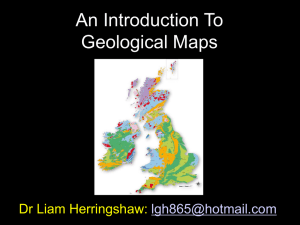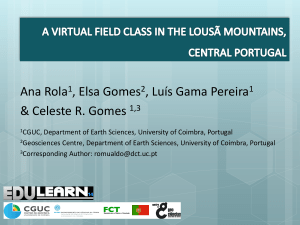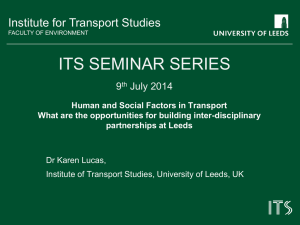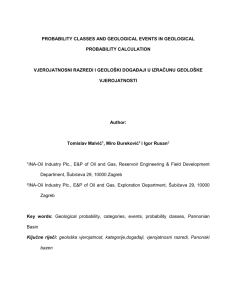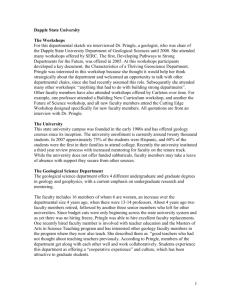Geological map of Leeds area - School of Earth and Environment
advertisement
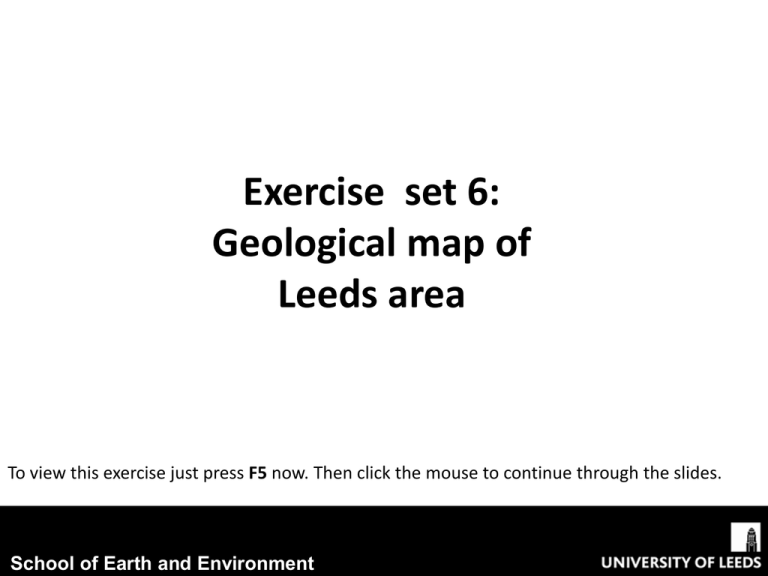
Exercise set 6: Geological map of Leeds area To view this exercise just press F5 now. Then click the mouse to continue through the slides. School of Earth and Environment Geological map of Leeds area • This presentation is to be completed in conjunction with exercise worksheet 6. Objectives: • The aim of this exercise is to gain more experience of: • Using and understanding geological maps • Drawing sketch maps • Drawing a simplified cross section to illustrate the structure •Identify and interpret faults •Locate areas of economic interest School of Earth and Environment Geological map of Leeds area • Using exercise worksheet 6, the geology of Britain viewer and any internet resources available to you, complete each question then click for the answer before continuing onto the next. • First go to: http://www.bgs.ac.uk/discoveringGeology/geologyOfBritain/viewer.html Or navigate to it from the BGS website via: www.BGS.ac.uk • Click on “Open geology of Britain viewer” • Click “Go to location” • Type “Leeds” • Click “Switch basemap” then choose “OpenStreetMap” School of Earth and Environment Geological map of Leeds area • Study the map and geological key (by clicking on “1:50 000 geology key”) • Then by clicking on the rock types name, more information can be found out about that particular unit. • Using this information in conjunction with internet resources, answer the questions on the following slides. School of Earth and Environment Geological map of Leeds area 1. What geological periods are represented and what age range do they span? The geological periods represented are: Superficial deposits Name Description Period Age (Ma) Alluvium Clay, silt sand and gravel Flandrian 0-0.012 Till Mixed Devensian 0.010-0.011 Till Mixed Mid Pleistocene 0.126-0.781 River terrace deposits Sand and gravel Quaternary 0-2.588 Bedrock geology Name Description Period Age (Ma) Thornhill rock Sandstone Duckmantian 311-314 Various other sandstones Sandstone All Langsettian 316-314 Penine lower coal measure Mudstone, siltstone, sandstone Langsettian 316-314 Rough rock/flags Sandstone Yeadonian 316-318 School of Earth and Environment Geological map of Leeds area 2. What is the oldest carboniferous formation on the map? Name a specific locality where you might find an outcrop. The oldest carboniferous formation on the map is the Rough rock sandstone This can be found in the North-West of the map. Example: around Abbey road. 3. Write a brief rock description including depositional environment of the Pennine lower coal measure. Interbedded grey mudstone, siltstone and pale grey sandstone, commonly with mudstones containing marine fossils in the lower part and more numerous coal seams in the upper part. These rocks were formed in marginal coastal plains with lakes and swamps periodically inundated by the sea; or estuaries and deltas, and shallow seas. 4. On what formation is the University of Leeds situated? (you may have to zoom a little for this) The University of Leeds is partly located on the Pennine lower coal measure and partly on the sandstone. School of Earth and Environment Geological map of Leeds area 5. Why are many of the units disjointed? Due to faulting in the area. 6. What is the general trend of faulting in the area? The general trend of faults is SW-NE. 7. What is the displacement along the fault that the University of Leeds is situated upon? Using the scale bar at the bottom, it is roughly 1.3km. You may need to zoom to measure this. School of Earth and Environment Geological map of Leeds area On the rough base map provided: 8. Sketch the approximate boundaries between the lithological units and also the overlaying superficial deposits. School of Earth and Environment Geological map of Leeds area 9. Mark on the map where there used to be a river bed. School of Earth and Environment Geological map of Leeds area 10. Mark on the map the general direction of younging of the bedrock. School of Earth and Environment Geological map of Leeds area 11. Mark on the map the unconformity. School of Earth and Environment Geological map of Leeds area 12. What is the reason for the shape of the outcrop highlighted by the circle? This displacement of younger middle Pennine coal measure into the older lower Pennine coal measure is due to a large fault. School of Earth and Environment Summary You should now be more familiar with: • Using more complex geological maps. • The geology of the Leeds area. • The appearance of faults on geological maps. • The appearance of superficial deposits on geological maps. • How to draw a quick sketch map. School of Earth and Environment

